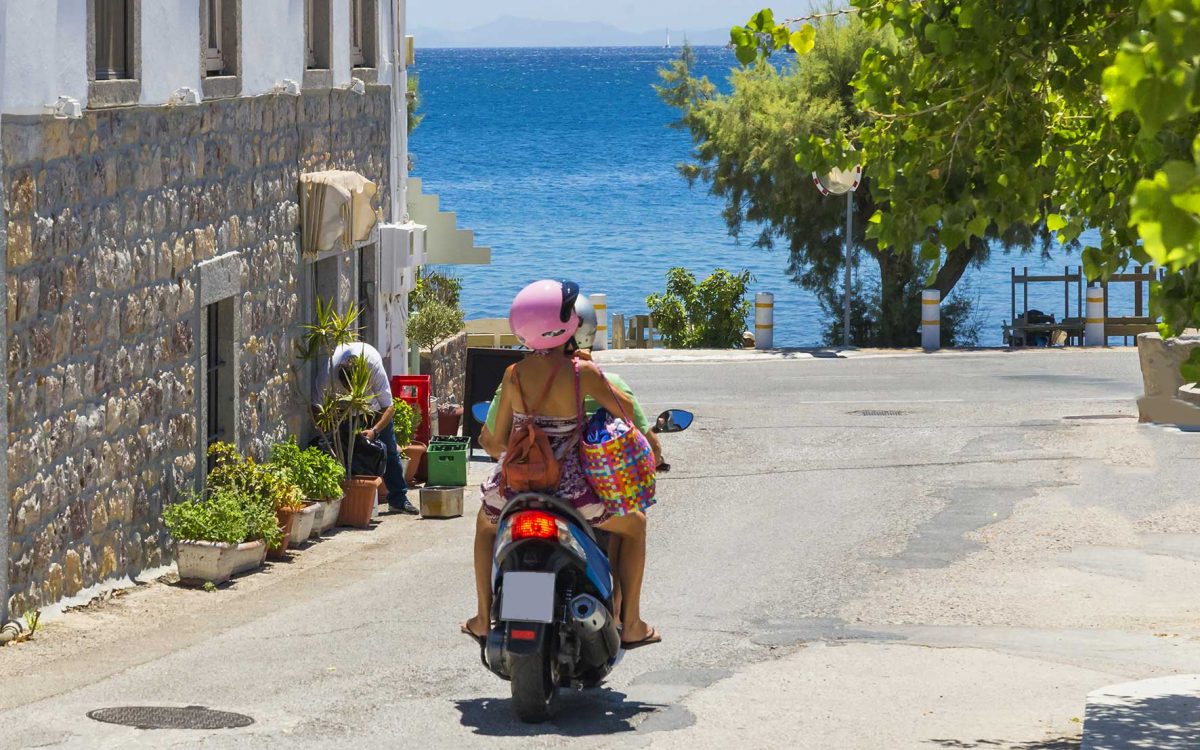To the uninitiated, the thought of riding around on a scooter in Greece may seem a bit daunting. Everyone’s in a hurry, especially in the heavily congested towns and cities, honking horns and paying no attention to the rules of the road. It often feels like traffic lights and speed limits in this country are merely … “suggestive.”
That said, campaigners and law enforcement officials in recent years have done a great deal to clean up Greece’s unenviable reputation as one of the most dangerous places in Europe to drive. Thanks to their persistent efforts, Greece’s roads are becoming much safer, and that’s good news for tourists, especially those who want to hire vehicles to explore all the “nooks and crannies” this sun-blessed country has to offer.
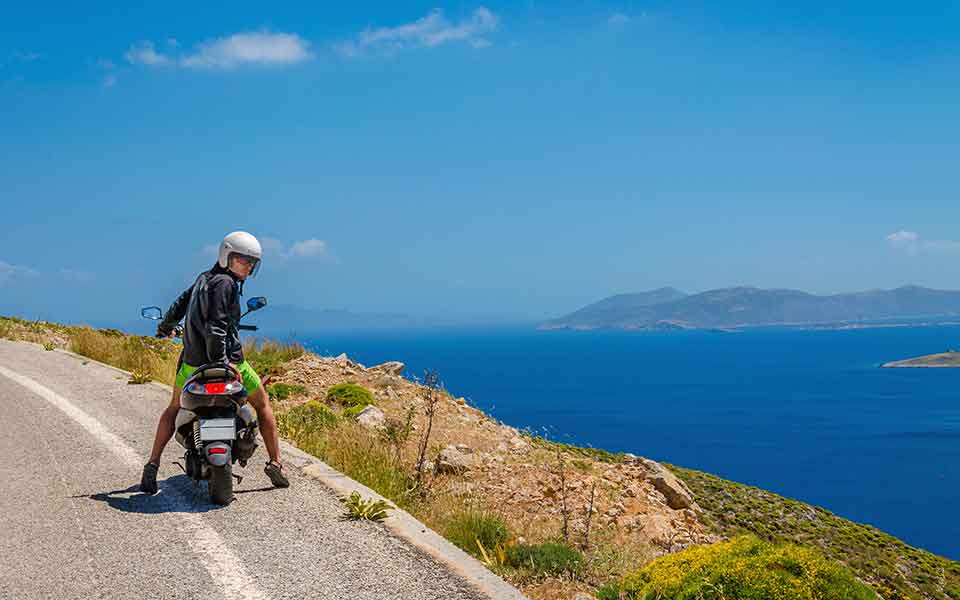
© Shutterstock
For experienced motorists from abroad, especially those who make a habit of renting vehicles when on vacation, riding a scooter (or “papaki” in Greek – literally “little duck”) is synonymous with independence. This is especially true when visiting one of Greece’s many islands, lined with narrow, winding streets, picturesque villages, and hard-to-reach beaches. Not having to worry about train or bus schedules, or the added expense and hassle of taking taxis everywhere, a scooter gives you unbridled freedom to choose your own adventure.
Despite the obvious risks to personal safety (and it’s important to mention them), we feel, on balance, with the right precautions and due care and diligence, riding a scooter can be a wonderful experience, and open up new horizons that you may otherwise miss. Another massive bonus is that it’s much cheaper than renting a car, and you won’t have to worry about finding a parking space!
Here is everything you need to know about renting a scooter in Greece, which, in most respects, can also be applied to hiring a light motorcycle (“papi”) and/or a four-wheeled quad bike (All Terrain Vehicle/ATV).
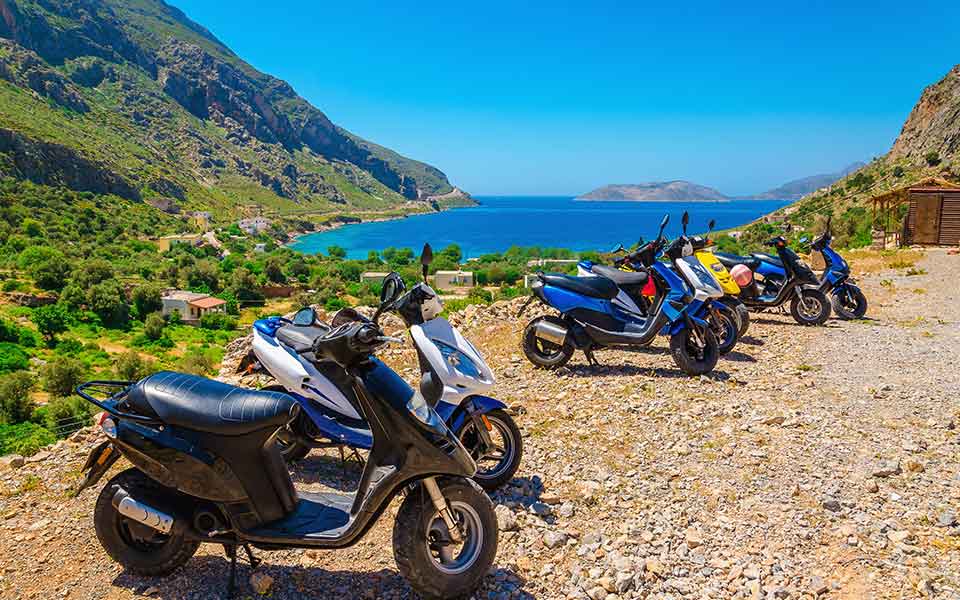
© Shutterstock
REQUIREMENTS
First and foremost, the minimum age to rent a basic scooter (125 cc) in Greece is 18 years. In addition, the vast majority of scooter rentals will only lease their vehicles to persons who have prior experience – i.e., you can’t simply rock up as a first-timer.
Furthermore, due to a tightening of the rules, all non-EU visitors must be in possession of a valid driving license and an International Driving Permit (IDP), a relatively inexpensive document (5.50 GBP in the UK, for example) that serves as a translation of your national license. The IDP is really a must-have item for those who make a habit of driving outside of their country of residence; it also certifies what categories of vehicles you’re allowed to drive, and is valid for one year. More information on how to apply for an international permit can be found here.
Renters from other EU countries must present a valid license, issued by their own national driver and vehicle licensing agency (DVLA). Since 2013, EU licences have had the same look and feel – a credit card-sized plastic photo-card that serves as a single license for the whole European Union. You will also need to present your passport/identity card and a credit card to the rental company.

© Shutterstock
To rent a scooter in Greece, your driving license must include one of the following categories: AM, A1 or A. These qualify you to drive mopeds/scooters and light motorcycles and quads, most commonly between 50 to 125 cc.
Maxi-scooters or touring scooters with more powerful engines, from 200 to 850 cc, require an A2 license category, and renters typically need to be older, at least 23 years old, with a minimum of 24 months driving experience.
When driving about Greece, foreign visitors must keep their driving permit AND passport with them at all times. In the event of an accident, failure to present these two documents to the police can result in a large fine.
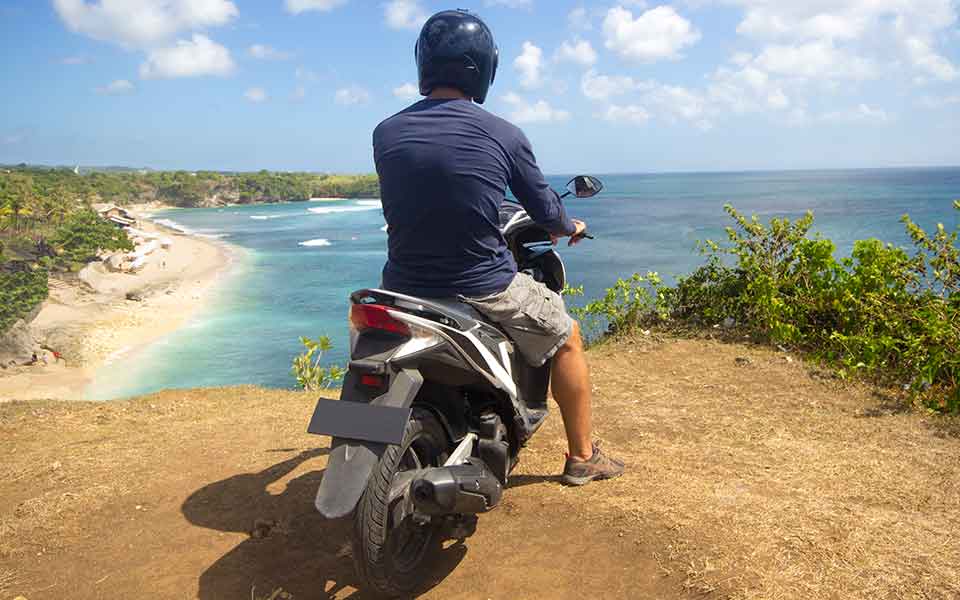
© Shutterstock
WHERE TO RENT A SCOOTER, AND HOW MUCH DOES IT COST?
Scooter rentals are more-or-less ubiquitous in most parts of Greece, especially around ferry ports and airports. Rental shops can also be found in town centers and in the vicinity of holiday resorts. If staying at a hotel, always ask the staff to recommend a good and reliable rental company in the local area. Such arrangements often come with a discount on the rental price.
Depending on the size of the scooter, expect to pay around 25 to 30 euros per day, less than a third of what you’d pay for a car. It’s usually standard for rental bikes to be insured for third party damage by default, but always check with the rental company. Additional insurance, daily or weekly, can be arranged on request, although it’s important to stress that no insurance company in Greece provides total coverage for rental scooters.
Fuel is always paid for by the hirer, as are any traffic fines incurred during the rental period.
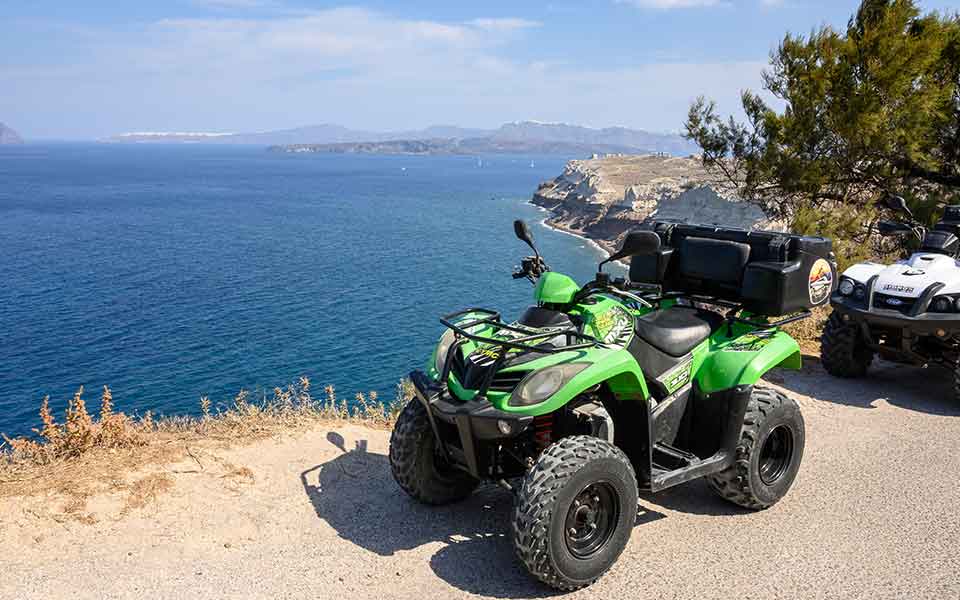
© Shutterstock
SCOOTER VERSUS QUAD BIKE
Four-wheeled “All Terrain Vehicles,” or quad bikes, are a lot more robust than your average scooter. As such, they’re a great way explore areas of the countryside that are off the beaten path, not to mention hard-to-reach beaches.
Most scooter rentals will also stock quad bikes in their inventory, so they’re easy to find, but they’re usually a touch pricier – around the 40 to 50 euro mark for a daily hire, depending on the season (still a lot cheaper than a car).
As above, you’ll need a valid license, but if you’ve never ridden one before, you’ll need to take extra care. Despite having four wheels, quads are notoriously easy to roll, so take it easy when approaching corners. They can be powerful, too (350 cc and up), so get some advice from an experienced rider about the delicate art of throttle control.
In similar fashion to the larger, more powerful scooters, quads can carry two people, making it a cost-effective option for couples traveling on a budget.

© Shutterstock
12 + 1 IMPORTANT THINGS TO REMEMBER
Driving is on the right-hand side of the road. Always overtake on the left.
At crossroads and junctions, priority is given to vehicles coming from the right, unless directed otherwise.
Priority is given to vehicles entering a roundabout.
Pedestrians have priority at “zebra crossings.”
Traffic lights in Greece use the international 3-color system, but many Greek drivers speed up when they see amber instead of slowing down. Always check your mirrors.
Drive defensively and always check your blindspots. It’s fair to say that the notion of safe stopping distance – aka the “three second gap,” essential for safe driving – is a completely alien concept in Greece.
Road signs are almost always bilingual, Greek and English.
Distances and speed limits are measured in kilometers / km per hour. In residential areas, speed limits are between 30 and 50 km/hour. Patrol officers sometimes use hand-held speed radars without warning, so be sure to adhere to the limits.
Many of the highways in Greece are modern and built to a very high standard. Tolls for scooters and motorcycles typically range from 1.5 to 3 euros.
Always wear a helmet. Many of your fellow bikers won’t, but it’s the law!
Remember to wear sunscreen, and don’t forget to apply plenty to your legs and across your shoulders.
It’s tempting to wear flip flops, but don’t. Better to wear something a bit more substantial – reefs or trainers, for examples.
Dial 112 for emergencies (equivalent to 911 in the US).
Ride safely and have fun!

